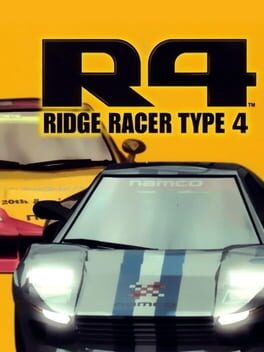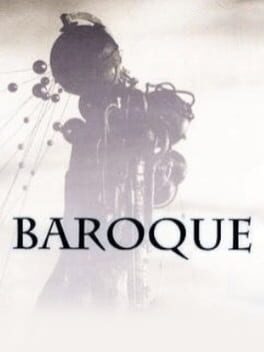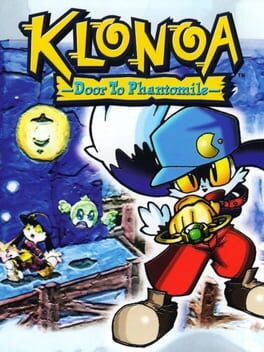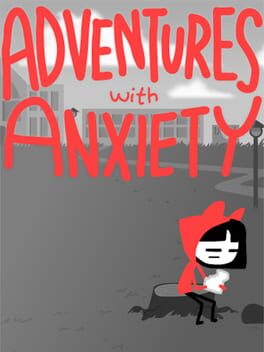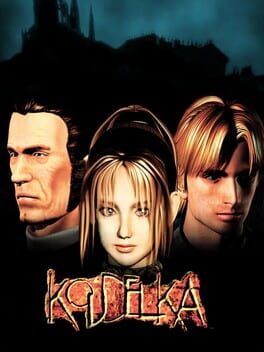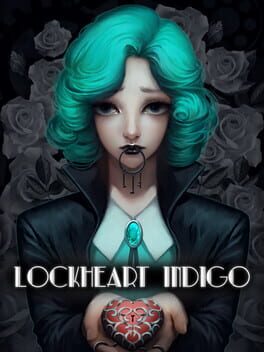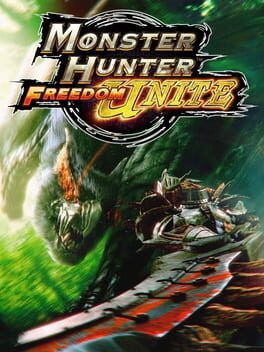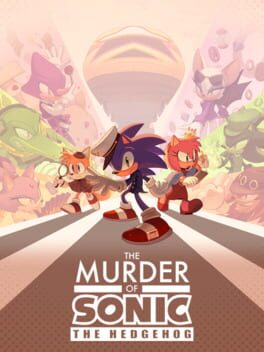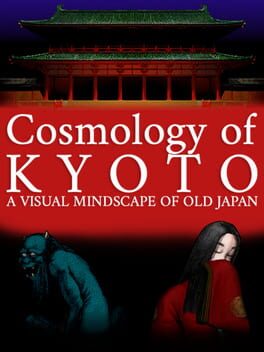Colamerda
2023
A Doom II mod realized to honor the memory of a lost friend, which very quickly morphs into a maze of distorted worlds and secrets hidden behind rather complex exploration mechanics that add an uncanny charm to the gaming experience.
Getting to the true ending without the support of a guide is virtually impossible, but it's evident that this is a game that embraces the dynamics of discussion within mods enthusiast communities: this is also why it reminded me so much of my experience with Yume Nikki and in general the idea of games that mysteriously appear as puzzles to be solved in a spirit of collaboration among those who feel motivated to learn more.
A wistful and nostalgic adventure built from faded scraps of memories and disassembled games, in which the greatest pleasure is to find yourself lost.
Getting to the true ending without the support of a guide is virtually impossible, but it's evident that this is a game that embraces the dynamics of discussion within mods enthusiast communities: this is also why it reminded me so much of my experience with Yume Nikki and in general the idea of games that mysteriously appear as puzzles to be solved in a spirit of collaboration among those who feel motivated to learn more.
A wistful and nostalgic adventure built from faded scraps of memories and disassembled games, in which the greatest pleasure is to find yourself lost.
2022
1998
Iconic racing game capable of instantly fascinating with mind-blowing graphics, a very refined overall UI design and a killer soundtrack, but also supported by rock-solid driving mechanics.
I don't have a lot of experience with racing games of this kind, and frankly, until now I wasn't even particularly drawn to them, but with Ridge Racer Type 4 for some reason I immediately felt I had to dive in and see how far the driving experience could go. Driving in this game is really an experience that engages all the senses at once, with the tactile feel of the tight drifting mechanics that you gradually get used to and the audiovisual magic that is created on each track: it really is a gameplay delight from all points of view.
I also enjoyed the nice touch of the little narrative excerpts that take place between grand prix races, with the leaders of each team interacting with the protagonist, gradually revealing their motivations and emotional connection to the racing world.
I don't have a lot of experience with racing games of this kind, and frankly, until now I wasn't even particularly drawn to them, but with Ridge Racer Type 4 for some reason I immediately felt I had to dive in and see how far the driving experience could go. Driving in this game is really an experience that engages all the senses at once, with the tactile feel of the tight drifting mechanics that you gradually get used to and the audiovisual magic that is created on each track: it really is a gameplay delight from all points of view.
I also enjoyed the nice touch of the little narrative excerpts that take place between grand prix races, with the leaders of each team interacting with the protagonist, gradually revealing their motivations and emotional connection to the racing world.
1998
Unfortunately never officially released outside Japan, Baroque absolutely deserves to be considered a cult classic due to the extremely innovative perspective it offered in terms of narrative structure encased in game mechanics, elements that can occasionally be found even today in the roguelite field, but still manage to come across as unique: launching the game we are thrown into a distorted, post-apocalyptic world inhabited by surreal-looking creatures and drenched in a bleak and intensely surreal atmosphere, we are plunged into an enigmatic quest caught between reality and simulation, in which annihilation and rebirth go side by side, in an endless cycle of creation and destruction of this lost world that we are eventually destined to break.
Everything really comes together beautifully, both in terms of gameplay between roguelite, rpg, dungeon crawler and survival horror elements (yikes), and in terms of aesthetic and narrative coherence with horror inspirations, science fiction, mystical themes brought together in an obscure existentialist plot.
It is truly a masterpiece that knows how to fascinate and keep you glued to the controller, where each run turns out completely different from the others.
Everything really comes together beautifully, both in terms of gameplay between roguelite, rpg, dungeon crawler and survival horror elements (yikes), and in terms of aesthetic and narrative coherence with horror inspirations, science fiction, mystical themes brought together in an obscure existentialist plot.
It is truly a masterpiece that knows how to fascinate and keep you glued to the controller, where each run turns out completely different from the others.
Rather ingenious simulation game with board game elements, in which the goal is to achieve ecological transition by zeroing out CO2 emissions and gaining independence from fossil fuel consumption. It's very interesting in the way it manages to be cleverly educational by showing how many variables are at play in the fight against climate change and how everything is related from the political, social, economic, and environmental perspectives.
It is neither a rhetorical nor a catastrophic nor a satirical game, it's an experience in which the challenges of the modern day are shown in a quite simple and straightforward way, but at the same time aware of their complexities: there is no single answer to the best path to take, but there are an infinity of different aspects that have to be balanced with each other in the right way.
It is a profoundly interesting and instructive game, and it is also free!
It is neither a rhetorical nor a catastrophic nor a satirical game, it's an experience in which the challenges of the modern day are shown in a quite simple and straightforward way, but at the same time aware of their complexities: there is no single answer to the best path to take, but there are an infinity of different aspects that have to be balanced with each other in the right way.
It is a profoundly interesting and instructive game, and it is also free!
In the vast landscape of platformers of the '90s Klonoa succeeds with dignity in carving out its own space: the basically two-dimensional structure in which there is occasionally a three-dimensional interaction with elements in the background works very well in maintaining the skill set of traditional platformers, modernizing it both in terms of mechanics and visual richness.
The result is truly a feast for the eyes, in which different paths and areas yet to be unlocked intertwine with each other while remaining visible in each section of the levels, creating a very satisfying sense of progression as you get to solve the simple puzzles that direct the gameplay experience.
Between very cool bosses and neat mechanics that push to use enemies in creative ways to overcome obstacles and unlock new directions, what I think Klonoa can still offer today is a very refined and thoughtful idea of a classic platformer that, as simple as it may be, still remains extremely enjoyable.
The result is truly a feast for the eyes, in which different paths and areas yet to be unlocked intertwine with each other while remaining visible in each section of the levels, creating a very satisfying sense of progression as you get to solve the simple puzzles that direct the gameplay experience.
Between very cool bosses and neat mechanics that push to use enemies in creative ways to overcome obstacles and unlock new directions, what I think Klonoa can still offer today is a very refined and thoughtful idea of a classic platformer that, as simple as it may be, still remains extremely enjoyable.
I definitely didn't expect to be confronted with such a relatable and mature game, capable of so accurately depicting anxiety disorders and the stressful thoughts they carry along without becoming too discomforting or overly trivializing the theme.
This game was a wonderful surprise, and I can say that I felt genuinely understood and accepted in certain difficulties of mine, in a way that I have rarely found even in more complex and ambitious projects.
I'd like to say a lot more because it's a game where you can tell there was really an excellent process of study and understanding behind it, both on a scientific and personal level, but right now I just feel very grateful and hope it will be enjoyed by as many people as possible.
This game was a wonderful surprise, and I can say that I felt genuinely understood and accepted in certain difficulties of mine, in a way that I have rarely found even in more complex and ambitious projects.
I'd like to say a lot more because it's a game where you can tell there was really an excellent process of study and understanding behind it, both on a scientific and personal level, but right now I just feel very grateful and hope it will be enjoyed by as many people as possible.
Everything I thought I wanted from a metroidvania, with a TON of insane ideas thrown in as well.
Symphony of the Night feels like a game that has no intention of taking a break, throwing something new at you all the way to the end, starting with the very incipit that has you impersonating a vampire defending humanity from the dark forces of Dracula: from here it's a perpetual stream of reversals, of mechanics and objects that relentlessly disrupt your approach to the game, of roles that switch due to obscure deceptions, artfully elevating the excitement of exploration and challenge, until literally turning the game world upside down.
It's a game that is meant to be discovered, full of secrets and hidden gimmicks, that is not afraid to cross the boundaries between genres, stealing all the way from role-playing games to fighting games to delve into an all-around epic experience.
But then the visual realization of the castle and enemies, the SOUNDTRACK, the artworks of Ayami Kojima defining the aesthetic identity of the characters and the game world, the thousands of ways to break the game and destroy everything without difficulty, the totally flawless design of the game map and integration between areas... it's all AMAZING, I am SPEECHLESS
Symphony of the Night feels like a game that has no intention of taking a break, throwing something new at you all the way to the end, starting with the very incipit that has you impersonating a vampire defending humanity from the dark forces of Dracula: from here it's a perpetual stream of reversals, of mechanics and objects that relentlessly disrupt your approach to the game, of roles that switch due to obscure deceptions, artfully elevating the excitement of exploration and challenge, until literally turning the game world upside down.
It's a game that is meant to be discovered, full of secrets and hidden gimmicks, that is not afraid to cross the boundaries between genres, stealing all the way from role-playing games to fighting games to delve into an all-around epic experience.
But then the visual realization of the castle and enemies, the SOUNDTRACK, the artworks of Ayami Kojima defining the aesthetic identity of the characters and the game world, the thousands of ways to break the game and destroy everything without difficulty, the totally flawless design of the game map and integration between areas... it's all AMAZING, I am SPEECHLESS
2016
Extremely fascinating experiment in video game topography, offering an explorative experience of an abstract space through enigmatic tools and parameters that are not immediately comprehensible, but become natural to use very quickly.
The process of understanding the elements on screen is set up in a very interesting and open way, as you are initially drawn into randomly fumbling over the controls to play with the different shapes and shades of color that can be created, while you gradually and independently find yourself understanding what variables allow you to identify points of interest and proceeding with exploration.
There is something truly profound and unique about such an experience, where it becomes necessary to take your time to consider the various interactive possibilities that change your perspective on the space to bring out the object you seek: as the exploration unfolds, the space around the player transforms, becomes enriched with different dimensions to consider that eventually connect to new points of view on the surrounding environment.
A game consisting of only intangible and ethereal forms, that embodies in a very conscious and unique way the very essence of discovery, in its most intimate meaning.
The process of understanding the elements on screen is set up in a very interesting and open way, as you are initially drawn into randomly fumbling over the controls to play with the different shapes and shades of color that can be created, while you gradually and independently find yourself understanding what variables allow you to identify points of interest and proceeding with exploration.
There is something truly profound and unique about such an experience, where it becomes necessary to take your time to consider the various interactive possibilities that change your perspective on the space to bring out the object you seek: as the exploration unfolds, the space around the player transforms, becomes enriched with different dimensions to consider that eventually connect to new points of view on the surrounding environment.
A game consisting of only intangible and ethereal forms, that embodies in a very conscious and unique way the very essence of discovery, in its most intimate meaning.
1999
I feel like Koudelka is one of those games that sort of becomes a bit hard to appreciate without actually taking into account the context in which they were released: on a technical level, it was universally acclaimed for being highly innovative in its use of motion capture and for the creation of truly stunning cgi scenes, elements that for his time certainly led the way for new perspectives on the expressiveness of storytelling through the physicality of characters.
It is also certainly interesting how these technical factors have been applied to a gothic horror setting, created with the goal of providing an experience that is dense with atmosphere and rich in interactive cues, with many environmental puzzles and objects to collect to enhance the gameplay experience.
Unfortunately, Koudelka was also, and above all, a title with a troubled gestation, which had to juggle too many different angles without really coming to a sufficiently defined direction, ending up integrating very different influences with, in my opinion, very variable results.
It was definitely an overly ambitious project for a rookie independent studio, which had to manage an overly complex balance between survival horror, tactical rpg-like elements and genuinely wanting to push the immersiveness front.
What we are ultimately faced with while playing Koudelka is a not always satisfying experience, one that works quite well as an rpg and much less so as a horror game, with great charm and a real passion oozing from every angle, very fascinating to look at but not as original to play.
It is also certainly interesting how these technical factors have been applied to a gothic horror setting, created with the goal of providing an experience that is dense with atmosphere and rich in interactive cues, with many environmental puzzles and objects to collect to enhance the gameplay experience.
Unfortunately, Koudelka was also, and above all, a title with a troubled gestation, which had to juggle too many different angles without really coming to a sufficiently defined direction, ending up integrating very different influences with, in my opinion, very variable results.
It was definitely an overly ambitious project for a rookie independent studio, which had to manage an overly complex balance between survival horror, tactical rpg-like elements and genuinely wanting to push the immersiveness front.
What we are ultimately faced with while playing Koudelka is a not always satisfying experience, one that works quite well as an rpg and much less so as a horror game, with great charm and a real passion oozing from every angle, very fascinating to look at but not as original to play.
2020
Investigative game with a noir tone in which a mystery crime must be solved by questioning various suspects and exploring the crime scene.
The interrogation mechanic is constructed in a quite unique way and that is what makes the game special: you are given a set of dialectical tools through which you can overcome the psychological defenses of the questioner, whether by pressuring his insecurities, flattering him or confronting him with the reality of the evidence.
It's all pretty simple and straightforward, but it's really remarkable how in a little 8-bit game you can find such in-depth writing that creates a cast of characters differing in motivations, moral values, and temperaments, which obviously require different strategies to deal with.
The interrogation mechanic is constructed in a quite unique way and that is what makes the game special: you are given a set of dialectical tools through which you can overcome the psychological defenses of the questioner, whether by pressuring his insecurities, flattering him or confronting him with the reality of the evidence.
It's all pretty simple and straightforward, but it's really remarkable how in a little 8-bit game you can find such in-depth writing that creates a cast of characters differing in motivations, moral values, and temperaments, which obviously require different strategies to deal with.
2021
Ugly to look at, inspired by the predatory mechanisms of the gambling industry in which the developer used to work, created by plagiarizing other games and built on roguelite elements made utterly brainless.
Gaming at its worst, in an embarrassingly dispassionate way, without an ounce of shame.
Unfortunately it is kinda fun.
Gaming at its worst, in an embarrassingly dispassionate way, without an ounce of shame.
Unfortunately it is kinda fun.
As a novice in the Monster Hunter franchise, I cannot evaluate the game in comparison with other titles in the series, but for the experience I had, it was truly a blast ride.
The game structure is truly engaging and complex: it is incredibly satisfying to be faced with a seemingly insurmountable obstacle, which after a long series of adjustments to the arsenal and offensive approach becomes perfectly manageable, and in general every aspect of the game is supported by a strong emphasis on a progression that forces you to get used to annoying situations and try alternatives you did not expect to consider.
I found myself several times having to learn from scratch one of the various and extremely different weapons available and in each case it was a rewarding and satisfying experience. I find that it is critical for games of this type to properly set up a virtuous circle of frustration/success to really build a meaningful bond with the player who decides to stand by the often harsh rules of the game to test themselves, and this is something I really appreciate: this is where MHFU in my opinion really shines.
It is definitely not a perfect game and often seems almost unfair: the moves of some monsters have huge hitboxes that are difficult to properly read, there are extremely punishing elements that can undermine your hunt in a matter of seconds, the controls are slow and clunky, but at the end of the day all these flaws are simply enriching the fundamental mechanic that makes Monster Hunter successful: adapt, learn, and improve your hunting.
The game structure is truly engaging and complex: it is incredibly satisfying to be faced with a seemingly insurmountable obstacle, which after a long series of adjustments to the arsenal and offensive approach becomes perfectly manageable, and in general every aspect of the game is supported by a strong emphasis on a progression that forces you to get used to annoying situations and try alternatives you did not expect to consider.
I found myself several times having to learn from scratch one of the various and extremely different weapons available and in each case it was a rewarding and satisfying experience. I find that it is critical for games of this type to properly set up a virtuous circle of frustration/success to really build a meaningful bond with the player who decides to stand by the often harsh rules of the game to test themselves, and this is something I really appreciate: this is where MHFU in my opinion really shines.
It is definitely not a perfect game and often seems almost unfair: the moves of some monsters have huge hitboxes that are difficult to properly read, there are extremely punishing elements that can undermine your hunt in a matter of seconds, the controls are slow and clunky, but at the end of the day all these flaws are simply enriching the fundamental mechanic that makes Monster Hunter successful: adapt, learn, and improve your hunting.
Adorable investigative visual novel with some fun running sections in the form of a basic minigame.
I don't think this game had any reason to be so good, but somehow it really manages to fully succeed in everything: from the STUNNING visual presentation, to the soundtrack, to the wholesome and fast-paced story, full of plot twists and sudden changes in tone, everything is vibrant, varied, playful, and after just a couple of hours manages to leave the player with a heart full of joy.
In its own small way, although it started as a joke, it is a game made with a big heart and a strong artistic sensibility.
I don't think this game had any reason to be so good, but somehow it really manages to fully succeed in everything: from the STUNNING visual presentation, to the soundtrack, to the wholesome and fast-paced story, full of plot twists and sudden changes in tone, everything is vibrant, varied, playful, and after just a couple of hours manages to leave the player with a heart full of joy.
In its own small way, although it started as a joke, it is a game made with a big heart and a strong artistic sensibility.
1993
Cosmology of Kyoto appears at a first glance as an interactive horror experience that transports you into a medieval Japan filled with death and desolation, disturbing and mysterious in a way that perhaps very few other games manage to be, but it is soon realized that it is much more than simply that: is also a virtual encyclopedia of myths, legends, historical facts, habits and values of an entire culture, which are meticulously described in rich fact sheets accessible at any time from a game menu.
Cosmology of Kyoto is a bizarre and surreal object in which you constantly die and resurrect, in which it only matters to keep moving forward by looking around and exploring every reference that the game puts in front of you, in which you wander through piles of corpses and otherworldly realms, get dismembered by demons and tricked by ghosts, get reincarnated in a thousand different bodies, and relive centuries of stories and legends miraculously enclosed in a couple of hours of Japanese hallucinations.
It's really unfortunate that there's not a properly accessible way by today's standards to enjoy this game because I think it really deserves to be among the very few games that manage to make a category of their own, to function in some way by only resembling themselves and delivering such a rich and special experience.
An extraordinarily cultured and insightful nightmare, as wonderful to look at as it is free from all categories, experimental and curious in every single aspect.
Cosmology of Kyoto is a bizarre and surreal object in which you constantly die and resurrect, in which it only matters to keep moving forward by looking around and exploring every reference that the game puts in front of you, in which you wander through piles of corpses and otherworldly realms, get dismembered by demons and tricked by ghosts, get reincarnated in a thousand different bodies, and relive centuries of stories and legends miraculously enclosed in a couple of hours of Japanese hallucinations.
It's really unfortunate that there's not a properly accessible way by today's standards to enjoy this game because I think it really deserves to be among the very few games that manage to make a category of their own, to function in some way by only resembling themselves and delivering such a rich and special experience.
An extraordinarily cultured and insightful nightmare, as wonderful to look at as it is free from all categories, experimental and curious in every single aspect.


